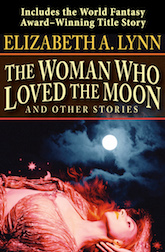I started the QUILTBAG+ Speculative Classics series with books I really enjoyed, but I want to cover as much terrain as possible, and be honest about what did or did not age well. I expected to likewise enjoy The Woman Who Loved the Moon, Elizabeth A. Lynn’s first short story collection—with the title story a World Fantasy Award winner in 1980. I’d heard good things about this book, and while it has been long since out of print, it is generally recognized as a queer classic.
I had mixed feelings. I felt this book was uneven (even beyond the unevenness that can be expected from a collection). While the secondary-world, epic fantasy stories were striking and memorable, the science fiction fell short in unexpected ways.
Buy the Book


The Woman Who Loved the Moon: And Other Stories
The collection starts on a high note—“Wizard’s Domain” was my favorite story in the book, and I think it holds up well to this day. “Wizard’s Domain” is about a relationship between two men: an all-powerful, demigod-like wizard, and an experienced sailor. They set out together to fight another wizard threatening to expand his territory, but nothing goes quite as planned. I loved the character interactions, the magic, the adventure, the power imbalance…this hit the spot for me. Interestingly, according to the notes prefacing each story, “Wizard’s Domain” was Lynn’s first completed work—though it was published much later and after several rewrites.
The next story, “The Gods of Reorth,” is also one of the strongest—you can read this one online, because it was reprinted in Strange Horizons a few years back. This novelette uses the vocabulary of fantasy, but is in fact far future science fiction, with a woman observer living on a pastoral, vaguely Ancient Greek planet. She is ordered to promote war and imperialism among the local inhabitants, contrary to what she believes is right. The story depicts a beautiful romantic relationship between two women—though it does require a warning that, in accordance with the tropes of the time, the relationship ends in tragedy. (I generally try not to spoil much in these reviews, but I feel this needs to be said.) Yet even though the relationship comes to a grim end, the ending is not entirely hopeless; quite the opposite, in fact. The story also touches on reproductive themes without overbearing biological essentialism. I’m not surprised it has been reprinted online so recently.
From here on, we move to the near future with “We All Have to Go,” the author’s first published story. The main theme of media voyeurism is possibly even more timely today, but I found the plotting of this story entirely haphazard. Moreover, the characters weren’t particularly distinctive, and the Chicago setting also didn’t quite come alive compared to Lynn’s fantasy landscapes. Most of Lynn’s published longer-form work is epic fantasy, and this story and many of the following ones came across to me as if she was still searching for her voice and themes.
Several of the science fiction stories that follow in this volume, including “The Saints of Driman,” “I Dream of a Fish, I Dream of a Bird,” or “The Circus That Disappeared” feel dated, and not due to any genre gimmick or tech that would come across as outmoded in the present. She doesn’t write about fax machines in space, though there is one story about a telephone booth—but that one can be read as contemporary to when it was written, not set in the future. Rather, Lynn’s SF feels dated because of its social-political approach, and specifically its treatment of racism and colonialism.
She tries to tackle themes of colonialism, and introduce characters of color, but she goes about both in a way that is hamfisted at best, hurtful at worst. There is one story (“I Dream of a Fish, I Dream of a Bird”) in which a dark-skinned boy from Vancouver literally turns silver after a medical treatment, with no awareness or discussion of the racial aspects or implications, but only a kind of glee over the technological gimmick. I enjoyed the story up until that moment—it had a kind of ambience that could even be said to anticipate the current solarpunk movement. But the author’s own unexamined biases came to the fore in a way that threw me out of the otherwise engaging plot.
Possibly the most painful story to read is “The Circus That Disappeared,” in which a tall Black man is portrayed in very dehumanizing ways as a threat, and then he indeed becomes one. Editors exist in part to gently point out to authors when they base antagonists in their own racial anxieties, and this is a good example of a story that would have been better off not being published in its present state.
“The Saints of Driman” suffers from a similar problem, this time with issues relating to colonialism. This is one of those “woman anthropologist discovers a strange alien culture” stories that were so popular in 1970s-80s feminist SF, executed more or less successfully. This particular narrative includes all the related exoticizing tropes, except with a facile color swap, where the anthropologist main character is dark-skinned: “The people of Ares-Ak are used to seeing me in their streets. Only children sometimes trail after me, to stare at my foreign dark hair and skin.” It is not a subversive notion to show dark-skinned and especially Black women having white colonialist attitudes, while the exoticized natives are white; it is rather the opposite. It is a form of shifting blame, and at the same time appearing to be progressive on the surface. I would like to say that this kind of plot is now dated, except I keep on coming across it in much more recent work by other authors, too.
I also got the impression that some of the stories were only included for the sake of… completism? Maybe the publisher wanted to release a collection rapidly after “The Woman Who Loved the Moon” won the World Fantasy Award. At least, I can’t quite interpret the author’s own comments in the book otherwise, as she writes in discussing “Obsessions”: “The story troubles me; I’ve reworked it over and over, and can’t help feeling that there’s something missing in it. It’s the only one of my stories with which I am strongly dissatisfied.” This raises the question of why this piece was included in the first place.
Mercifully, the title story, which appears at the end of the collection, is again as strong as the opening two novelettes were. “The Woman Who Loved the Moon” has a beautiful mythic resonance, even as it is rather mournful, and strong sapphic themes.
Overall, this collection shows the author still looking for her own domain—the stories where I feel she has found it (“Wizard’s Domain,” “The Gods of Reorth,” “The Woman Who Loved the Moon”) are well worth reading to this day. They also offer very early examples of explicitly queer main characters, at a time when very few writers were able to reach major markets with these themes. The rest of the book, however, particularly the science fiction stories, might be better skipped. Next time, we will return to novels, but I am planning on covering more work by Lynn later—especially her high fantasy novels, some of them set in the same settings and continuities she introduced in this collection.
Bogi Takács is a Hungarian Jewish agender trans person (e/em/eir/emself or singular they pronouns) currently living in the US with eir family and a congregation of books. Bogi writes, reviews and edits speculative fiction, and is currently a finalist for the Hugo, Lambda and Locus awards. You can find em at Bogi Reads the World, and on Twitter and Patreon as @bogiperson.










